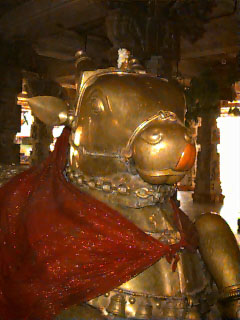 |
|

|
|
A brass Nandi at our local temple |
|
| Being a Brahmin: Nov. 9th |
|
| This weekend Uncle took a very disparaging attitude towards
"the labored class". When the topic of servants is brought up in conversation,
every Indian native I have met with a servant will say "Our maid-servant (driver,
cook, etc.) has been with us for 10 years, and is a member of the family", followed
by "You have to watch these servants very carefully, they steal, slack-off, etc., all
the time, but with such a nice tongue". I thought we had great servants. In the last
few days, I’ve learned why uncle says these things. Yesterday Jude complained that he
was being worked too hard; we have kept him for 12-hour days about every other day in the
last week. He wanted 10 rupees an hour for every hour past 9 hours. He gave me the
standard pity pitch — "food is so expensive, my mother is old and ill, and
can’t cook breakfast for me", etc. We’ve treated Jude very well; his salary
is 3,000 rupees per month, compared to the average of 1500 for a driver. So after a chat
with Sue, I suggested to Jude that he had a choice. He could continue to work as a
salaried employee; this would mean that he would be paid when we were gone 4 weeks of the
year to the states, and that when we gave him days off, like Sunday, he would still be
paid. Alternatively, Jude could be paid hourly. Wisely Jude saw the light and chose salary
at 3000 rupees. Then Ramesh, the security guard took off for coffee, and never came back
for the night shift. It was followed the next morning by my call to his company, and a
subsequent fine of 50 rupees (two days wages). I paid Ramesh’s fine, out of kindness,
and out of fear of retaliation, but I also gave him a lecture about not leaving the place
unguarded. Today, Lakhshmi, the maid, took about 25% of our clothespins hanging off the
clothesline. So Sue now has to watch the servants, and I have to change my messy habits,
and keep everything in locked drawers. |
|
| Sue is trying to learn all she can about Indian religion.
Her current research is on Shiva. When you go to a Shiva temple, there is always a
"nandi" pointing to the direction of the Shiva lingam. A nandi is a bull, and is
Shiva’s vehicle. Every god rides on some animal - Shiva’s is nandi, Ganesh, the
elephant god rides on a rat (If you think that an elephant riding on a rat is silly, then
you haven’t seen the size of the rats in India). Anyway, when you see a nandi, the
equivalent of a catholic genuflect is to grab nandi’s testicles, This is the desired
movement for maximum fertility. Since nandi is always sitting down, I don’t quite
know how this is done. |
|
| We’re also learning a lot about what Brahmins have
done to rule India. The caste system appears to be a Brahmin invention. It’s a sad
thing. Because respect is based on rigid and hierarchical rules, genuine respect for your
fellow man is rare. Instead respect is based on relationship; are you inferior, or
superior? This rule seems to extend to nature. If you’re one of the god’s sacred
vehicles you are treated with respect. Consequently cows get respect, as do the
bandicoots, the largest rats in the world. But if you go to the zoo, you see folks
throwing stones and sticks at the rhinoceros. |
|
| Sue tells me that Brahmins only play string instruments.
Lower castes are allowed to play woodwinds. Being mouth instruments, they get filled with,
as Sue says, "one of the twelve, icky, secretions of the body" (saliva). I
don’t know what Brahmins would do with a MIDI clarinet. |
|
| I had a Brahmin grandmother who came to America to stay
with us for a while. She would not eat off of our plastic or china plates. These were made
of earth, and unclean (those 12 icky secretions again). She insisted on only eating off of
metal plates. She found a metal pie-plate in the laundry room. In no position to argue, we
quickly washed the plate. No one told her that until that moment it had been the dog dish. |
|
|
|
|
|